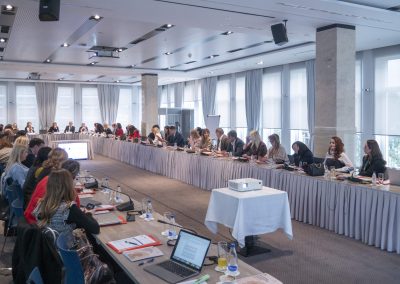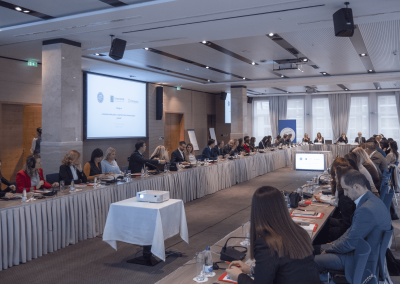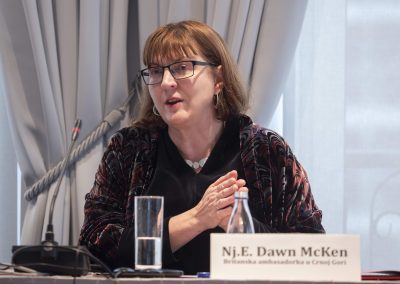Roundtable in Budva: Enhancing Judicial and Police Responses to Gender-Based Violence
8 February 2024, Montenegro
Almost every femicide could have been prevented, which is why it is necessary to improve inter-institutional cooperation. This would enable timely response to early signs of violence, ensure adequate prosecution, and ultimately prevent gender-based violence and femicide, concluded at the opening of the roundtable “Improving judicial practice in cases of sexual and gender based violence and femicides”, which is being held today and tomorrow in Budva.
The AIRE Centre and Chemonics UK, in collaboration with the Montenegrin Centre for Training in Judiciary and State Prosecution, with the support of the British Government, brought together over 60 representatives from key institutions of the judicial chain, including courts, prosecution offices, police, civil society, and experts from Montenegro and the region.
“Femicide is not an isolated incident. It is often the result of years of physical, psychological, and economic abuse of women, or inadequate institutional responses to these types of violence. Therefore, this event is an important step towards an open dialogue among experts directly involved in these cases and who assist victims. Our goal is to examine every link in the chain of justice and identify ways to improve collaboration. This is crucial for ensuring that punishments for perpetrators are proportionate and deterrent, that justice for victims is holistic and satisfactory, and ultimately, to deter such crimes in the future”, said Biljana Braithwaite, Director of the Western Balkans Program at the AIRE Center, at the opening of the roundtable.
From 2020 to 2022, there were 5 femicides in Montenegro, as shown by the research of the AIRE Center and FemPlatza titled “Judicial Response to Femicide in the Western Balkans: Legal Framework and Judicial Practice“. The actual number is likely higher; however, due to the lack of official statistics, data is mainly gathered from media and other relevant reports. Through an analysis of court judgments, this research has shown that the majority of femicides occur in the victims’ homes, and that the perpetrators, in most cases, are their intimate partners and family members. In other words, for women, the most dangerous place is often their own home.
“A strong judicial response requires effective and coordinated measures for the prevention, investigation, and prosecution of crimes. Therefore, collaboration between the judiciary, local communities, police, and civil society organizations is of utmost importance. We all have a responsibility to support victims, provide them with information about available support, and encourage them to seek necessary assistance”, explained Braithwaite.
Christopher Marshall, team leader of the project Western Balkans Rule of Law Initiative, which is funded by the British Government, emphasized that research conducted within the project highlights the importance of incorporating more trauma-informed practices and the need for the voices of victims to be fully heard.
“The key barrier to the aforementioned approach in many jurisdictions, including Montenegro, are gender-based norms that influence how any of us perceive these issues. Public expectations of institutions working in the field of criminal justice are high, and it is important for them to be met. For this reason, we are proud of our broader partnership with the police, prosecution, and judiciary, as well as the opportunity to gather local, regional, and international experts in the field of gender-based violence through this roundtable, to unify our perspectives and thus better support the overall justice system”, explained Marshall.
Marshall further explained how Chemonics UK, through its activities in Montenegro, seeks to provide greater support to the police, prosecutors, judges, and other relevant institutions, to facilitate survivors’ access to the justice system, ensuring their protection and pursuit of justice.
At the event, Dawn McKen, the British Ambassador to Montenegro, delivered an addressed, stating that this event provides an opportunity for judges, prosecutors, and other legal professionals from Montenegro to discuss issues of sexual and gender-based violence and femicide in Montenegro and beyond, aiming to find a better judicial response to these crimes.
The Ambassador explained that sexual and gender-based violence and femicide – the most extreme manifestation of violence against women – must be the subject of special focus globally. “This is the case in Montenegro as well, due to the growing concern about the severity of this crime”, Ambassador McKen emphasised.
“Behind every femicide case stands a life extinguished too soon, a family shattered, and a community left in mourning. The fact that they still occur is a painful reminder of how far we must go on our journey towards gender equality and justice. The United Kingdom is proud to be your partner in these efforts, and we look forward to the discussions that will take place today and tomorrow.”, said Ambassador McKen.
An adequate judicial response can contribute to combating gender-based violence and femicide only if the punishments reflect the severity of the crime. As part of the event, the AIRE Center and FemPlatz presented a judicial handbook “Processing Femicide Cases“, which provides recommendations for protecting the rights of victims of attempted femicide in criminal proceedings, especially considering their rights to be treated with dignity and respect, to avoid prejudices, the right to protection of their identity and safety, and their right to seek compensation for non-material damage resulting from the crime.





